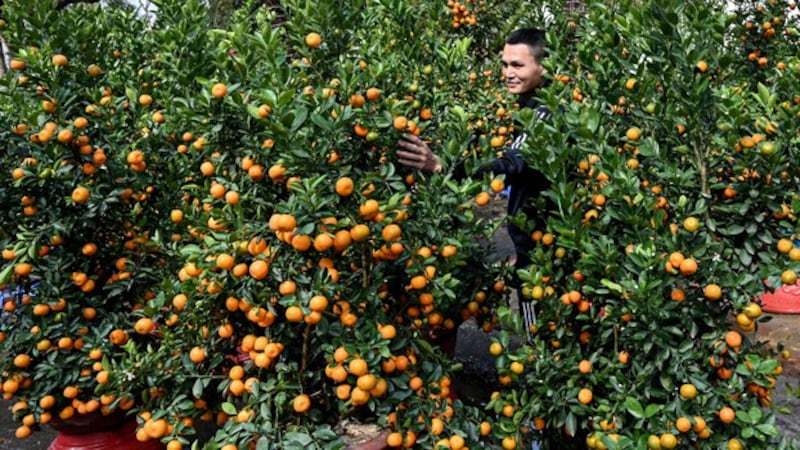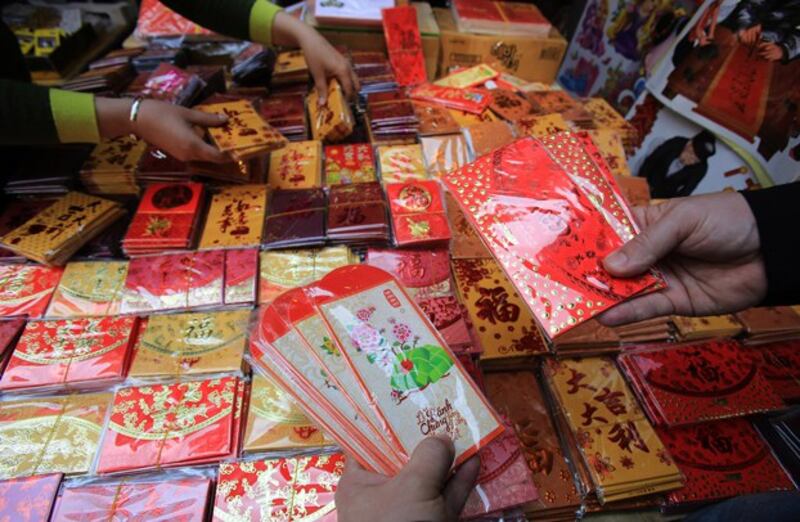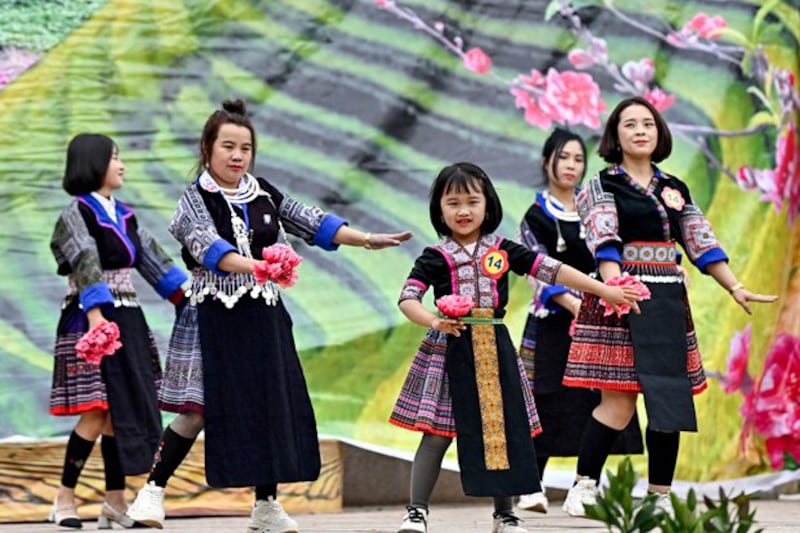When he was young, Duc believed that celebrating Tet — the Vietnamese Lunar New Year — was just about exchanging lucky red envelopes filled with money.
But as he grew older, the recent university graduate who works as an instructor at a gym in Hanoi began to appreciate the onset of spring associated with the holiday. He started relishing dishes such as bamboo-shoot soup, fried spring rolls and glutinous rice cakes – which are only eaten during Tet – and make time to extend well wishes to family and friends.
Celebrating Tet is a long-standing tradition of the Vietnamese, but older generations must explain its significance so that young people can appreciate its meaning and preserve its customs, said Duc, who asked to be identified under a pseudonym so as to not attract the attention of authorities in the one-party communist state or jeopardize his family’s safety.
“Lunar New Year is celebrated so grandly that I feel that even if I don’t want to participate, I still enjoy activities such as delivering New Year’s wishes, and then enjoying Tet dishes,” said Duc, who lives with his mother and grandparents in Hanoi’s Ba Dinh district. “Having many people to do it with me makes me feel happier.”
The most important celebration in Vietnamese culture, Tet marks the arrival of spring based on the Vietnamese calendar, and this year fell on Feb. 10. The official holiday includes the day before New Year's Eve, New Year's Eve and New Year’s Day, though the festivities can last up to a week.
During Tet, people also offer rice to the spirits of their ancestors to come and celebrate with their children and grandchildren, and they end their last meal by burning fake notes known as “heaven’s money” to say farewell to their ancestors until next year. Everyone then returns to their jobs or to their farms.
Holiday bonus
This was the first year that Duc, 23, received a holiday bonus and gift basket from his employer, and he gave part of his money and the basket to his mother. He also helped clear their house to “welcome his ancestors” to celebrate Tet.
Ancestor-worship activities, displaying flowers and visiting Buddhist temples are good practices to observe Tet and help slow down the otherwise hectic pace of life, Duc said.
“I like the spiritual aspect [of Tet],” he said. “Missing those activities in society would make me sad.”

Even though Duc is busy with his new job, he still took time out to give his family a peach blossom tree so they could use its flowers to decorate their home in their nearly 1,000-year-old village.
Vietnamese adorn their homes and offices with flowers from peach blossom and kumquat trees during Tet as symbols of prosperity and happiness for the year ahead.
But many young people in Vietnam still do not appreciate the true meaning of the holiday, and some feel compelled to work during its three official days off to make additional money, instead of enjoying Tet themselves, Duc said.
“For young people to appreciate Tet, they need to have a positive experience about Tet,” he told Radio Free Asia. “The older generation must show the younger generation what important values Tet carries.”
“That must be coupled with explanations – not just implementing our customs,” he said. “There are too many superficial activities. There needs to be some means of more effective communication between generations.”
‘Most joyful period’
Nguyen Minh Anh, 20, a second-year law student at a university in Hanoi, said she was always excited as a child when she had a long school break during Tet. She watched as others in her house made banh chung, a traditional Vietnamese cake made of rice, mung beans and pork wrapped in green leaves.
“Tet in my childhood memories is always the busiest and most joyful period,” she said.

Anh, who lives with her family in the capital, still enjoys the bustling atmosphere before Tet when she and her parents buy peach blossom and kumquat trees and new furniture, and decorate the house for the holiday.
The New Year is also a time when Anh and her relatives gather together to watch Tet comedy shows and fireworks to celebrate the New Year, she said.
In some families children and grandchildren line up in front of parents, grandparents and other elders in their homes just after Tet to wish them a happy New Year and to receive red envelopes with small denominations of money meant to bring them luck, good health and fortune.
Some, who open their envelopes immediately, will show their disappointment with small denomination bills, spoiling the custom’s good intentions, Ahn said.
“They value the face value of lucky money more than the meaning that the custom has developed over the years,” she said.
Ahn, who also works part-time for a bakery supplies company, said the atmosphere of this year’s Tet — the Year of the Dragon — is not as busy as in the past, due to many households cutting spending amid the country’s slower economic growth.
‘Simpler than in the past’
Meanwhile, Duc’s mother, who is a lecturer at a university in Hanoi, said in decades past – and especially during a period when Vietnamese had to rely on subsidies – shopping and buying food for the Lunar New Year was seen as a financial burden.
The woman, who is also an activist, asked to be identified by the pseudonym Tran Thi Huong, so as to not draw the attention of security forces who often intimidate her.
She said she remembers her mother “being afraid of Tet” because she was responsible for purchasing food for the celebration and making all other preparations for her family.

Huong’s family, like many others in Hanoi, are not buying up food for lavish meals during this year’s Tet, but are simply focusing on resting and decorating their homes for themselves, she said.
Though many people have skipped the preparation of elaborate food trays to last for days during Tet, Huong and her son still wrapped banh chung and visited relatives for the New Year, she said.
“These days, Tet celebrations are increasingly simpler than in the past,” Huong said. “People today have too many entertainment activities and many other interests. Especially since the launch of social media networks, people’s thoughts are scattered among many things, so the influence of Tet on spiritual life is no longer as strong as before.”
In the past during Tet, families gathered together to recall cherished memories and to confide in each other to build intimacy, she said.
“Nowadays, due to developed economic conditions, many people prefer other activities such as traveling abroad as a way to escape Tet,” Huong said.
Huong urged Vietnamese to maintain their traditions during Tet, especially now that the government gives civil servants and public employees several days off to celebrate.
“There are a few traditions that we think are good and should be maintained and not changed — worshiping ancestors, preparing Tet [food] trays and extending New Year’s wishes,” Huong said. “These are indispensable activities. There must be things that do not change, so it will be like a thread connecting the present and the future.”
Translated by Hanh Seide for RFA Vietnamese. Edited by Roseanne Gerin and Joshua Lipes.
